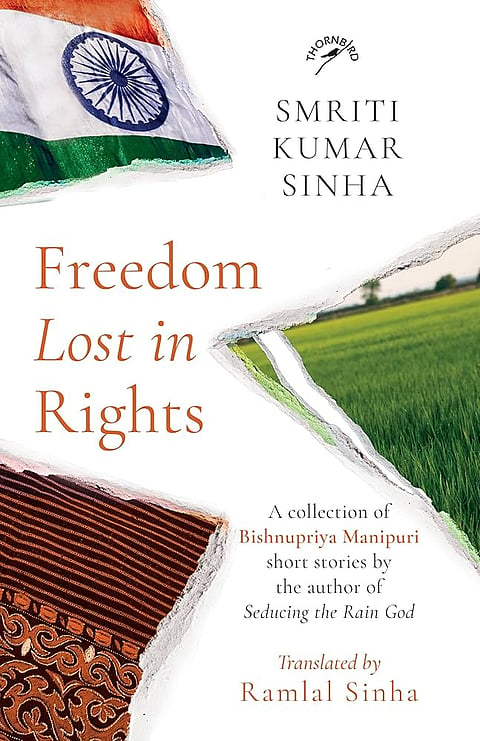
- Home
- Live Blog
- Breaking News
- Top Headlines
- Cities
- NE News
- Sentinel Media
- Sports
- Education
- Jobs

(A shorter version of the title story of this collection, ‘Freedom Lost in Rights,’ was published with a different title, ‘Shompens’ in The Melange, the Sunday supplement of The Sentinel, in 2011.)
Dipak Kurmi
(The reviewer can be reached at dipakkurmiglpltd@gmail.com.)
Author: Smriti Kumar Sinha
Translator: Ramlal Sinha
Publisher: Niyogi Books
Freedom Lost in Rights is an evocative and profound collection of short stories penned by Smriti Kumar Sinha, an eminent writer from the Bishnupriya Manipuri community, and rendered into lyrical English by Ramlal Sinha. This anthology not only captures the essence of a little-known language and culture but also plunges into universal themes that resonate across boundaries of geography, tradition, and time. A harmonious interplay of identity, belonging, and the fragility of a fading language forms the cornerstone of this collection, making it both a literary treasure and a poignant commentary on the cultural tapestry of Northeast India.
The collection comprises eleven stories, each a vibrant yet delicate thread in the intricate narrative fabric. These tales explore diverse themes, from love and friendship to caste discrimination, spirituality, and independence. Smriti Kumar Sinha masterfully portrays the struggles and joys of everyday life in the Bishnupriya Manipuri community, where ordinary moments are imbued with extraordinary emotional depth.
At its heart, the collection reflects the duality of resistance and hope, a duality that is perhaps most poignantly encapsulated in the language itself—a language endangered yet imbued with resilience. Through characters grappling with their roots, the stories evoke the struggles of a community striving to preserve its cultural and linguistic heritage. The nostalgic yearning of an old man for his native village, the tug-of-war between tradition and modernity experienced by two lovers, and the dreams of children wishing to sing in their mother tongue illustrate this duality with a tender, almost poetic poignancy.
The translation by Ramlal Sinha deserves special mention for its elegance and sensitivity. Sinha’s ability to retain the emotional cadence of the original Bishnupriya Manipuri stories while transforming them into graceful English prose is remarkable. His translation breathes life into the stories, creating a seamless lyrical flow that enhances their immersive quality. The reader is transported into a world where the richness of a syncretic culture comes alive against the backdrop of the lush landscapes of Northeast India.
Among the standout stories, Grass or Land touches deeply on the theme of friendship, depicting the innocent yet profound bond between Badan and Minu. Their prioritization of friendship over all else is portrayed with a raw emotional intensity that lingers long after the story ends. Similarly, The Lid offers a moving glimpse into the struggles of poverty, as a household prepares to welcome a guest with unwavering warmth despite their material hardships.
Gidei’s Bangles is a tender narrative of sacrifice, where Shanti breaks her treasured bangles to fulfil her little brother Thun Thun’s innocent wish. This act of love, though unacknowledged, resonates powerfully, reminding the reader of the silent sacrifices that often go unnoticed. Meanwhile, Akhanda-Prajna: A Love Story transcends the confines of romance, weaving an intricate tapestry of emotions and reflections on life. Akhanda and Prajna’s relationship explores not just love but also survival, philosophy, and spiritual connection, offering a narrative that feels almost transcendental.
The thematic core of the collection is independence, a concept explored through various lenses. Whether reflecting on personal freedom, cultural identity, or societal progress, the stories delve deeply into what it means to be independent yet interconnected. This theme elevates the collection beyond its immediate context, making it relevant to readers from all walks of life.
Smriti Kumar Sinha’s prose, as rendered by Ramlal Sinha, is notable for its simplicity and grace. The storytelling is subtle yet impactful, drawing the reader into a world where emotions are palpable, characters are vividly real, and imagery is vibrant. This seamless narrative style ensures that readers remain engrossed, experiencing each story as a journey that enriches their understanding of humanity and culture.
The auditory imagery in the book is another highlight. Sinha’s descriptions of sounds—whether it’s the rattle of a train, the rhythm of a bangle breaking, or the lub-dub of a heart—add a visceral dimension to the narratives. These details create a sensory experience that heightens the emotional resonance of the stories.
The physical presentation of the book is equally commendable. Designed by Maithili Doshi, the cover reflects the themes of unity, cultural identity, and inclusion. The choice of white as the background colour, paired with the Indian national flag and other subtle design elements, conveys a sense of harmony and universality that complements the book’s essence.
Freedom Lost in Rights is a remarkable collection that transcends its immediate cultural context to offer a universal exploration of identity, love, and resilience. It is a must-read for anyone who appreciates short stories that are rich in cultural nuance and emotional depth. Whether you are drawn to its themes of tradition and modernity, the struggles of a marginalized community, or the sheer beauty of its prose, this book promises an unforgettable literary experience.
Highly recommended for readers seeking to immerse themselves in a world where the local meets the universal, Freedom Lost in Rights is a tribute to the enduring power of stories to connect us all. Grab a copy, and let Smriti Kumar Sinha and Ramlal Sinha take you on a journey through the soulful landscapes of the Bishnupriya Manipuri world.